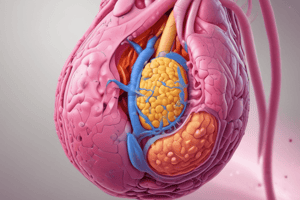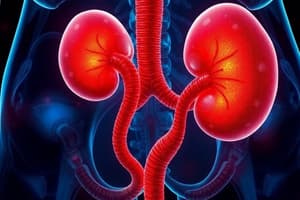Podcast
Questions and Answers
What is the peak age of onset for urolithiasis?
What is the peak age of onset for urolithiasis?
- Between 30 and 50
- Between 20 and 40 (correct)
- Between 10 and 20
- Between 40 and 60
What is one common symptom associated with urolithiasis besides pain?
What is one common symptom associated with urolithiasis besides pain?
- Headaches
- Joint inflammation
- Nausea and vomiting (correct)
- Shortness of breath
What does a high recurrence rate within 5 years indicate for urolithiasis?
What does a high recurrence rate within 5 years indicate for urolithiasis?
- It often causes fever
- It has a significant inherited component
- It may lead to sepsis
- It can cause progressive renal damage (correct)
What is a significant factor contributing to the increased prevalence of urolithiasis?
What is a significant factor contributing to the increased prevalence of urolithiasis?
What did the European Association of Urology (EAU) publish guidelines for in 2014?
What did the European Association of Urology (EAU) publish guidelines for in 2014?
What leads to the formation of stones in urolithiasis?
What leads to the formation of stones in urolithiasis?
What is the primary reason why recommendations for pharmacological treatment of urolithiasis are often based on expert opinion or clinical experience?
What is the primary reason why recommendations for pharmacological treatment of urolithiasis are often based on expert opinion or clinical experience?
Why is it important to divide urolithiasis into discrete clinical states for effective management?
Why is it important to divide urolithiasis into discrete clinical states for effective management?
What percentage of individuals have a lifetime risk of developing kidney stones?
What percentage of individuals have a lifetime risk of developing kidney stones?
What is the primary goal of medications prescribed for managing urolithiasis?
What is the primary goal of medications prescribed for managing urolithiasis?
Why has recent interest in controlled trials for pharmacological agents in stone disease arisen?
Why has recent interest in controlled trials for pharmacological agents in stone disease arisen?
How are recommendations for pharmacological treatment of urolithiasis typically made?
How are recommendations for pharmacological treatment of urolithiasis typically made?
Flashcards are hidden until you start studying




